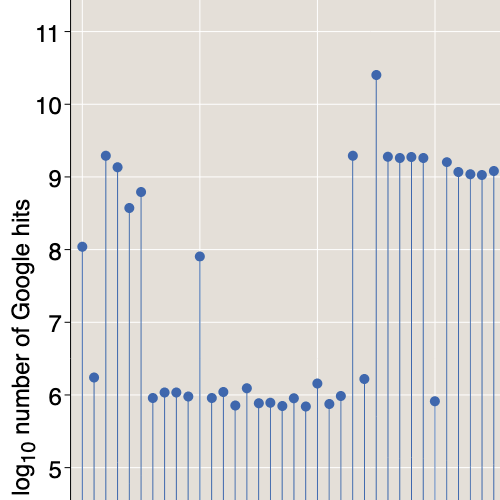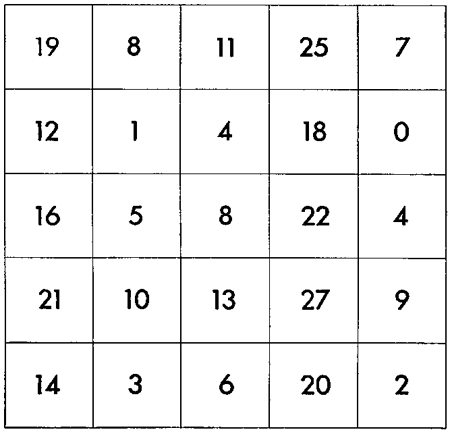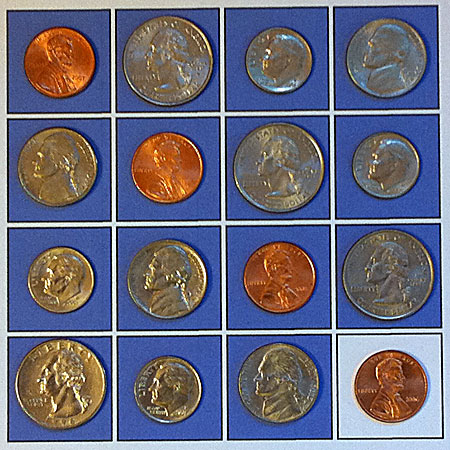Bracketology: The Madness of March
by Brian Hayes
Published 13 March 2009
The American Institute of Physics has just sent me a press release, whose subject line I have borrowed for the title of this post. The release discusses the mathematics of an upcoming college basketball tournament:
Mathematicians who study problems like these use combinatorics which helps them determine exactly how many possible outcomes there could be. Starting with 64 teams with two possible outcomes for each team - a win or a loss - the number of possible outcomes for the tournament is a staggering 2 to the power of 64: that is, 2 multiplied by itself 64 times, or 18,446,744,073,709,551,616 possibilities.
Not being much of a sports fan, I hadn’t realized exactly how basketball tournaments work. Now that I understand, I find it cheering. I’m going to root for the outcome in which all 64 teams win.
Responses from readers:
Please note: The bit-player website is no longer equipped to accept and publish comments from readers, but the author is still eager to hear from you. Send comments, criticism, compliments, or corrections to brian@bit-player.org.
Publication history
First publication: 13 March 2009
Converted to Eleventy framework: 22 April 2025




What about the play-in game?
O, that way madness lies; let me shun that;
No more of that!
That’s a really bad way of counting the number of possible outcomes of the tournament. For instance, one team will end up winning six times, and 32 teams will win 0 times. It seems that there really are 2^63, because there are 63 *games*, and two ways for each game to turn out. But none of those 2^63 involve all 64 teams winning.
“I’m going to root for the outcome in which all 64 teams win.”
What are you, some kind of hippie? :)
I’m rooting for the outcome in which every team loses except Wisconsin, which (according to the AIP’s counting method) wins…once.
I’m teaching a discrete math course this semester and I think I’ll use this as a problem on the midterm exam — I’ll quote the AIP’s press release and ask my students to fix their obvious error.
I agree with todd. Consider a simplified “March Idiocy” in which only 2 teams qualify for the “tournament.” Are there 2 to the power 2 outcomes? Hardly! There’s only one game!
But I think the AIP release is including the play-in game, so there really are 64 games to consider, the idea being that one might imagine trying to predict, in advance, the *exact* course of the tournment. If you google on “mike breen march madness” you can find essentially the same press release — but better explained — in 2004 and 2006. Mike Breen (who is quoted in the AIP press release) is the public awareness officer for the American Mathematical Society. He’s a great guy — and not responsible for the miswording of the AIP press release.
Mike Breen is indeed a great guy and a fine mathematician; obviously he didn’t write the AIP press release. Furthermore, Mike not only knows his math, he also knows his sports. Whereas I don’t. I had never heard of the “play-in game” (and I’m still not sure I’ve got that part of the story straight); the bracket I looked at (http://www.cbssports.com/collegebasketball/mayhem/brackets/viewable_men) shows only 63 games.
P.S. Dear Mike, How can I make it up to you? Please don’t ban me from the newsroom bagel table at the next JMM.
I did a calculation of possible winners midway through our office fantasy football season and determined that 3 teams were a lock, only the 4th playoff spot was still open. I used a bit mask like they tried to do above, with the difference that 0 = visitor won, 1 = home won. Fantasy football is catnip for computer geeks, so many things to compute on.
On an unrelated note, happy Pi Day to y’all:
http://skepchick.org/blog/?p=6404
I am surprised about the amount of math people learn vs. the amount they use in everyday life. If you aren’t a scientist, maybe America is overtraining in math? There is some hand-wringing because our math skills lag Singapore’s.
Brian,
First I have to wonder if I figured out the next element in the spam-screening sequence. If I get that wrong, I may be outsourced.
Barry is indeed right. When Ben Stein and I wrote that release, we figured in the play-in game (two teams play one game to determine who will get the 64th slot in the tournament, and play–and almost surely lose to–the #1 seed overall), and so that’s where we came up with the 2^64 possible brackets, because including the play-in in this play-off gives you 65 teams and 64 games. And what we came up with was the number of possible ways of filling out a “bracket.”
Ben has now left AIP for NIST (a one-letter promotion), and it looks like someone else has distilled what he and I wrote down to this. I didn’t get the 2009 version of the release. Even though the toothpaste is out of the tube (or cream cheese out of its packet), I will see if it can be fixed.
Bagels all around!
I know that this is off topic but I am host of a mathematics podcast
Combinations and Permutations that I think that your readership may find
interesting. On the last episode we have covered the four color theorem and some new ideas for mathematical journals. You can find the podcast on iTunes or through our host. Give us a listen, you
will not be disappointed
All,
Thanks for the post and comments. Glad my reputation is intact, at least for now! I’ll contact my old AIP colleagues as well to make sure they fix the new version of the March Madness release. It was always a pleasure to collaborate with Mike on the mathematics of sports stories; he has a gift for bringing the two subjects together.
Ben Stein
I like the way Brian wrote this blog post. Note that he didn’t just say, “the press release is wrong,” or “the number of possible outcomes should be 2^63, not 2^64.” Instead he made a little joke out of it, by following the chain of reasoning to its absurd conclusion. If all criticisms were couched in such subtle humor, the Internet would be a friendlier and more interesting place!
Mike, I want a Danish instead. 8-)
Dana is absolutely right about Brian and the Internet, which reminds me: What’s wrong with good old American pastries, that you have to have a Danish? You Left Coast liberals are ALL ALIKE!!!
Hmmm, that still seems less egregious than what the APS does with some of their press releases. :) What they wrote about work my collaborators and I did underwent an interesting bit of changes under time evolution.